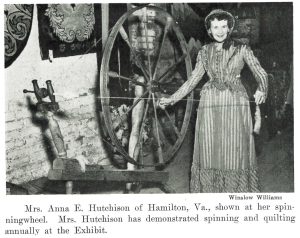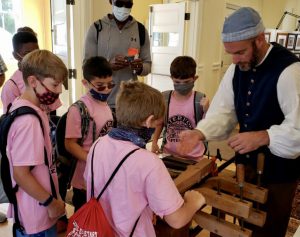Imagine yourself 250 years ago as the then English colonies on the coast of North America were heading towards revolution. Do you think of Massachusetts with the Minutemen and Paul Revere; or do you think about closer to home in Williamsburg and Patrick Henry’s exclamation of “give me liberty or give me death!”? While there were no Revolutionary battles or skirmishes known here in Loudoun, its residents still found themselves involved and impacted by the events and ideas of the Revolution during the eight years of the American Revolution and beyond, including here in Waterford.
The Waterford that would have heard the news of Patrick Henry’s speech in Williamsburg looks different from the Village we know now. First off, if you were to ask someone in Loudoun where Waterford was at the time, they might be a bit confused. The name “Waterford” didn’t start appearing until later in the century. People probably knew the area as “Janney’s Mill,” based on the mill and the road leading to the Village. Many of the landmark buildings we think of here were several decades away from construction, including the John Wesley Community Church, Corner Store, and Chair Factory. The Village had a population of approximately 150, mostly made up of Quakers coming from Pennsylvania and New Jersey as those colonies were filling up, including the influential Hague, Hough, and aforementioned Janney family. Scots-Irish immigrants, merchants, and craftsmen largely made up the rest.
So what was here during the Revolutionary War? As the name suggests, Janney’s Mill was most known for milling wheat, making it part of the English colony’s breadbasket. Mahlon Janney, son of original settler Amos Janney, had built his grist mill approximately twelve years prior and had placed a dam across the Catoctin Creek to shunt water to his mill and others. His mill would have most likely been somewhere near where the Waterford Mill stands today. Later on, he would also be responsible for the construction of the Schooley Mill before selling it to the Schooley family. Another note of this area’s milling prowess comes in Francis Hague and John Hough. These two were among the first flour inspectors in Loudoun County.
Of course, to be renowned for milling, there had to be things to mill. The majority of the community surrounding Janney’s Mill were farmers. These farms were based on the English tenant-leasing system, meaning many farmers in Loudoun did not own the land they farmed. Early farmers grew cash crops of tobacco and wheat, raised livestock, as well as food for their families.
This time period also set the precedent for craft in the Village. Craft trades, namely tanning, blacksmithing, and carpentry, were growing in the Village around the mills. These early craftsmen would take in apprentices from around the area to teach their craft. An apprentice was usually a teenager who entered into a years-long contract to work and learn the trade of a certain craft before going to work on their own. Some of these apprentices would go on in future years to open their own businesses in the Village.
Something that might be similar to Waterford now is the traffic and roads coming through the Village. Roads in the county were built first to connect mills and customers. Vestal’s Gap Road, connecting Alexandria and Winchester, came right through the center of Waterford, making trade and production for the mills, craftsmen, and farms along the Catoctin Creek easier.
Now in 2025, people all over the country are preparing to commemorate the 250th anniversary of the American Revolution. Loudoun’s committee, created in 2022 to plan the commemoration, is made up of representatives from historical and preservation organizations, historic sites, museums, libraries, Loudoun County Public Schools, Visit Loudoun, and interested incorporated towns that together represent all of Loudoun—past, present, and future. Together, the committee’s goal is to cultivate an understanding and appreciation of Loudoun’s past and a deeper investment in its future, and foster a space where everyone can see themselves in the American Revolution and how its ideas have shaped the County. Waterford connects to this story because the roots of what we know today as Waterford were laid during the years leading up to and including the American Revolution. Every resident of Waterford has grappled with what the founding principles laid out in this time period mean to them and how they can find themselves in the vast history of the region—from the original millers and farmers, Samuel C. Means and the Loudoun Independent Rangers, the John Wesley Community Church congregation, to Waterford’s preservation story starting with the ideas of Colonial Revival.
The Waterford Foundation is proud to be involved with other history and historic preservation organizations in the County to plan the commemoration of the American Revolution! Work has begun to commemorate the Revolution around the entire county. The committee has sponsored events and programs all over the county, from sign dedications, walking tours, open houses, lectures, and children’s programming, to introduce the public to life in Loudoun during the American Revolution. Activities to commemorate the American Revolution and learn more about this time period have been incorporated into this year’s Waterford Fair!
This is a continuation of a page in the Waterford Fair Booklet! If you want to learn more about the 81st Waterford Fair, check out the Fair page at waterfordfairva.orgre about the 81st Waterford Fair, check out the Fair page at waterfordfairva.org
 I remember the first “Fair” quite well. I was nine years old, my parents were two of the original Board and was so excited to go to the school auditorium and see all the things our friends and neighbors had created.
I remember the first “Fair” quite well. I was nine years old, my parents were two of the original Board and was so excited to go to the school auditorium and see all the things our friends and neighbors had created.